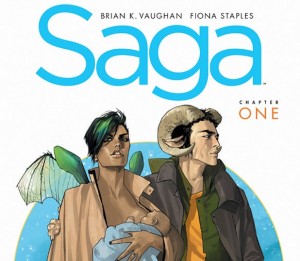[In preparation for the discussion during the Wonderworld Comics Book Club on Saga this weekend, I am happy to release the third part of Kelly’s exploration into Saga. You can read the first part here, and the second part here. Again, this article talks about sensitive adult topics (Larry)]
I’ve already written about the position of women and the male gaze in Saga. Now, I’d like to draw everyone’s attention to a very small discussion between Marko and Alana when they first met. They’re discussing a book that Alana treasures dearly, and the two of them have read into the novel that it’s a commentary on the war that is currently affecting both of them. Marko then makes a suggestion that’s intense and terrifying:
“What if the writer is suggesting that war will never end, that it’s a self-perpetuating cycle of pointless brutality that can only be ‘stopped’ with more war?”
Marko’s question is a direct allusion to perpetual war theory, which is frankly something I would never have expected to see in a comic book. As soon as I read Marko’s question, I sat back and just stared at my copy of volume two for a minute.
As I’ve previously stated, I’m newly-returned to comic books. I was into them when I was young, fell out of them, and am now into them again. Now that I’m older, wiser, more educated, more experienced, more depressed, more cynical, whatever you want to call it, I couldn’t be happier that I wandered into Wonderworld Comics one day and asked for recommendations.
You see, comics, just like any other type of literature, expand the mind. They force you to look outside yourself and be immersed into a storyline that can be very threatening, very exciting, very breathtaking. In addition to the writing itself, the illustrations move the story along, which is something you frankly don’t see in novels.
I realize that to some people, comics are juvenile and pointless. But they’re a very legitimate field of academic and artistic study, and if anyone doubts their legitimacy for an instant, I’d highly recommend they read Saga.
Saga deals with rape culture, race relations, war, family, various cultural expectations for various genders, and a host of other issues that you don’t really see a critical perspective on in mainstream young adult literature (if you doubt this, I draw your attention to Twilight, and I need say no more) or popular adult literature (have you READ anything by Dan Brown or James Patterson? They aren’t exactly addressing cultural norms).
All in all, I have to say, I’d be recommending comic books over literature for cultural theory questions any day.
